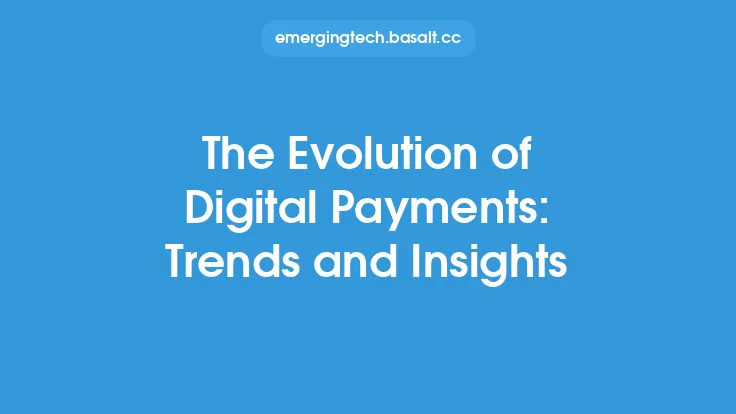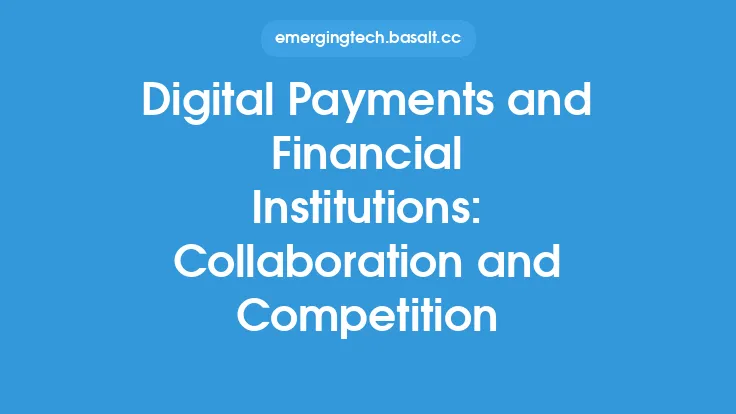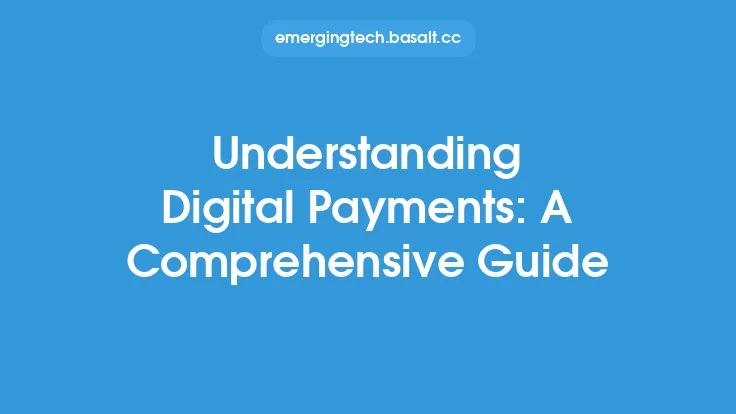The rise of digital payments has revolutionized the way we shop and conduct transactions online. E-commerce, in particular, has been a major beneficiary of this trend, with digital payments enabling fast, secure, and convenient transactions for online shoppers. In this article, we will explore the symbiotic relationship between digital payments and e-commerce, and how they have evolved together to create a seamless and efficient online shopping experience.
Introduction to Digital Payments in E-commerce
Digital payments have become an essential component of e-commerce, enabling online merchants to accept payments from customers through various channels, such as credit cards, debit cards, online banking, and digital wallets. The use of digital payments in e-commerce has numerous benefits, including increased convenience, speed, and security. With digital payments, online shoppers can complete transactions quickly and easily, without the need for cash or physical payment methods. This has led to an increase in online sales and revenue for e-commerce merchants, as well as improved customer satisfaction and loyalty.
The Role of Payment Gateways in E-commerce
Payment gateways play a critical role in facilitating digital payments in e-commerce. A payment gateway is a technology platform that enables online merchants to accept payments from customers through various channels, such as credit cards, debit cards, and online banking. Payment gateways provide a secure and reliable way for online merchants to process transactions, and they often offer additional features, such as fraud detection and prevention, recurring billing, and transaction reporting. Some popular payment gateways used in e-commerce include PayPal, Stripe, and Authorize.net.
Digital Wallets and Their Impact on E-commerce
Digital wallets, such as Apple Pay, Google Pay, and Amazon Pay, have become increasingly popular in e-commerce, offering online shoppers a convenient and secure way to make payments. Digital wallets use tokenization, a process that replaces sensitive payment information, such as credit card numbers, with unique tokens. This provides an additional layer of security for online transactions, as the actual payment information is not stored on the merchant's server. Digital wallets also offer a seamless checkout experience, allowing online shoppers to complete transactions with just a few clicks.
The Importance of Security in Digital Payments
Security is a critical component of digital payments in e-commerce, as online merchants must protect sensitive payment information from cyber threats and data breaches. To ensure the security of digital payments, online merchants must comply with industry standards, such as the Payment Card Industry Data Security Standard (PCI DSS). This standard requires online merchants to implement robust security measures, such as encryption, firewalls, and access controls, to protect payment information. Additionally, online merchants must use secure protocols, such as HTTPS, to encrypt payment data in transit.
The Impact of Digital Payments on E-commerce Business Models
Digital payments have had a significant impact on e-commerce business models, enabling online merchants to offer new and innovative services to customers. For example, digital payments have enabled the growth of subscription-based services, such as streaming media and software-as-a-service (SaaS) platforms. Digital payments have also enabled online merchants to offer flexible payment options, such as installment plans and financing options, which can help to increase sales and revenue. Furthermore, digital payments have enabled online merchants to expand their customer base, by accepting payments from customers in different countries and regions.
The Future of Digital Payments in E-commerce
The future of digital payments in e-commerce is likely to be shaped by emerging technologies, such as artificial intelligence (AI), machine learning (ML), and the Internet of Things (IoT). These technologies are expected to enable new and innovative payment methods, such as voice-activated payments and biometric payments. Additionally, the use of blockchain technology is expected to increase, enabling secure and transparent payment transactions. As digital payments continue to evolve, online merchants must stay ahead of the curve, by adopting new technologies and payment methods, and by prioritizing security and customer convenience.
Conclusion
In conclusion, digital payments and e-commerce have a symbiotic relationship, with digital payments enabling fast, secure, and convenient transactions for online shoppers. The use of digital payments in e-commerce has numerous benefits, including increased convenience, speed, and security. As digital payments continue to evolve, online merchants must stay ahead of the curve, by adopting new technologies and payment methods, and by prioritizing security and customer convenience. By doing so, online merchants can create a seamless and efficient online shopping experience, and increase sales and revenue in the process.





